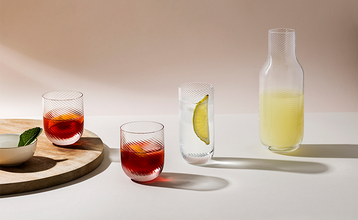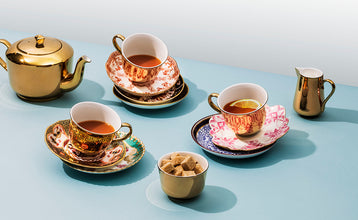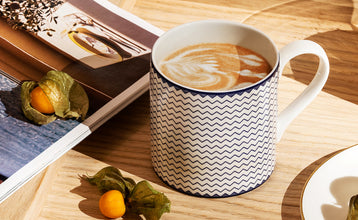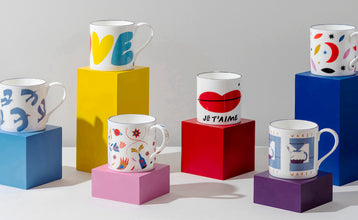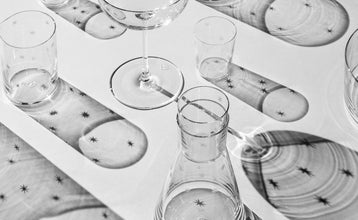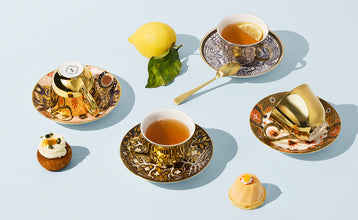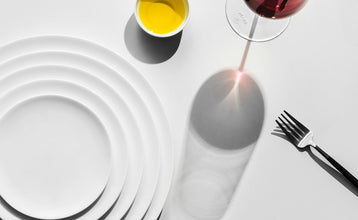Discover
Product Care
CARE INSTRUCTIONS - DISHWASHER RECOMMENDED
- Our glassware is lead-free and produced by master craftspeople with great care, representing some of the highest quality standards in the industry. To properly maintain your glassware, we encourage you to follow our care and cleaning instructions to ensure their longevity and to enhance your enjoyment of our products. We recommend washing drinking glasses in the dishwasher to avoid unnecessary handling.
- Adhere to the dishwasher manufacturer's advice on machine adjustments, as well as the amount of detergent, rinse aid, and salt to use. Make sure that you are using the proper detergents for your machine. Ensure your dishwasher receives regular maintenance as per the manufacturer's recommendations.
- Depending on your area's water condition, you may need to consider water softening agents. Please consult your appliance handbook for further guidance.
- It's crucial to maintain the cleanliness of the strainer inserts, filters, spray arms, and nozzles.
- Place glassware on the top shelf of your dishwasher ensuring adequate space between each piece so they do not clink together during the cycle. If you have a dedicated glass washer (ie. not for dishes or cutlery), we recommend you use this. If your dishwasher has a specific holder for stemmed glasses, this can offer additional protection during the cycle. Your machine may allow for adjustment of the height of the top shelf to allow more room - please consult your appliance handbook for more information.
- Opt for a gentle or specific glassware cycle that uses a lower temperature and the minimum necessary wash time. Look for a cycle with a glass symbol - our glassware is dishwasher-safe up to a maximum temperature of 60°C as high temperatures can encourage the corrosion of glass.
- After the wash cycle finishes, open the dishwasher door to let out the steam. Wait for the glasses to cool down before taking them out.
- To prevent smudges on stemware, handle the glasses by the stem or base.
- The products in this collection are made with lead-free glass which makes them resistant to clouding. If you do notice clouding on your glass then you will need to wash with water-softening, glass-specific detergents or even vinegar.
HAND WASHING
- If you cannot wash your glasses in a dishwasher, you can wash them by hand using a mild detergent and warm water. Fill the glasses half way, and let the glass soak before thoroughly and gently rinsing. Place upside-down on linen to drain.
- Where possible, remove rings from your fingers before handling, and avoid knocking the glasses on the sink, taps, or other items to prevent chips or breakages.
ADDITIONAL CARE
Normally your glass washer should steam and dry your glasses so they come out ready to use. However, if your glassware requires further polishing, please follow the below guidance.
- Use either one extra-large or two large microfibre (lint-free) polishing cloths to wick away residual moisture and gently polish when necessary. Avoid using tea towels, dinner napkins or other non-absorbent fabrics as this will increase the time spent polishing and therefore increase the likelihood of cracking or breaking the glass in the process.
- Hold the bowl of the glass with a cloth in one hand and tuck the remaining fabric into the bowl of the glass. Whilst cupping the bowl, gently move the glass in a circular motion to remove any residual moisture. Once the bowl is dry, use the cloth to polish the stem and the foot, ensuring your bare hands do not touch the bowl of the glass.
- Ensure never to hold the foot of a stemmed glass with one hand whilst polishing the bowl with the other. This will put tension on the stem and may lead to breakage.
Clouding Prevention:
- Our glassware is made with lead-free glass which makes them resistant to clouding.
- If clouding does occur for any reason, you can soak the glass in a 50/50 solution of white vinegar and warm water and this should remove stubborn marks.


















































